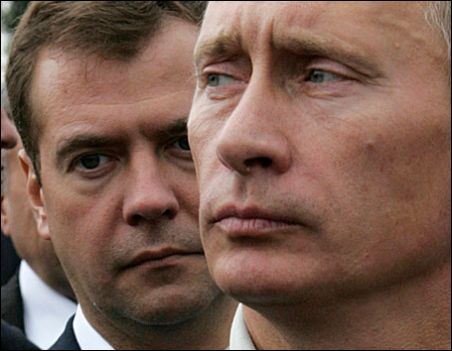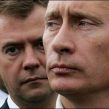
PUTIN’S CONSENSUS AMONG THE ELITE TESTED BY THE DEEPENING CRISIS
Publication: Eurasia Daily Monitor Volume: 5 Issue: 200
By:

For the vast majority of Russians the idea of a global financial crisis remains entirely foreign and the shocking figures about the meltdown on the domestic stock exchange are meaningless. The legendary Klim Petrovich—the Russian cousin of Joe the Plumber created 40 years ago by dissident poet Aleksandr Galich—does not own shares, has neither debts nor savings, and therefore has no reason to doubt the wisdom of Vladimir Putin’s course as executed by the amiable Dmitry Medvedev. The proverbial but entirely real Roman Abramovich, on the contrary, has lost a half of his fortune and allegedly had to postpone his wedding (Argumenty i fakty, October 10; www.newsru.com, 8 October). Every propaganda trick is being played in order to keep public opinion indifferent and hide the symptoms of the crisis in the real economy, but the elites who were massively enriched during Putin’s era know better than to put any trust in the “life-is-good” mantra and are searching for survival strategies (RIA-Novosti, October 16).
Putin’s major political achievement was securing firm support from many different groups of the elite: from successful entrepreneurs to empowered bureaucrats, from pompous top brass to ambitious artists. This elite consensus was sustained through the uncertain period of power transfer and the establishment of the Putin-Medvedev duumvirate, but now it is being tested by the crisis, which for the most part was completely unexpected. The abrupt end of a petro-prosperity that had been taken for granted has revealed and exacerbated divergences and clashes of interests among various groups of loyalists, who suspect that their “social contracts” have been revised without their consent.
It is the business elite that feels the most acute pain from the sudden turn of economic fortunes; and if the bankers were the first to be squeezed by the contraction of credit, now the industrialists are suffering from falling oil and commodities prices, and the construction sector is stumbling from boom to bust (Vedomosti, Expert, October 13). The government is delivering one rescue package after another, but their mechanisms remain so nontransparent that the banks prefer to use the infused money to purchase hard currency rather than to reopen credit lines (Vremya novostei, October 17). The most immediate problem for many companies is refinancing the Western credits maturing in the final quarter of this “opening” year of a disaster that is widely expected to last at least one more year. Who will be rescued from bankruptcy and who is the designated loser is open to bargaining, so the oligarchs have been camping around the Kremlin and wailing about their “social responsibility.”
Their worst misfortune is the unusual lack of clarity about who is making the decisions (www.gazeta.ru, October 17). Deputy Prime Ministers Igor Sechin and Sergei Ivanov have opened their doors to applicants, but they definitely have no authority to distribute money. Breaking every unwritten rule in the book, their master Vladimir Putin has been keeping a modestly low profile, even if plenty of the current problems should be handled from his prime-ministerial office. It is Dmitry Medvedev who is in the limelight announcing emergency measures and holding an economic council in the Kremlin last Thursday, which was not attended by either Putin or his two lieutenants (although Medvedev did hold separate meetings with each of the three). Whether Medvedev has really taken the lead or this is just a deliberately projected impression is anybody’s guess, but apparently some shrinking magnates like Oleg Deripaska are becoming desperate (www.rbc.ru, October 17).
Another elite group that has suddenly awakened to the prospect of painful downsizing is the military. After the impressive victory over Georgia, the top brass expected generous rewards, but the extra funding granted for the most urgent new tasks is pitiful compared with the tons of money unloaded to the privileged banks. The figures in the revised budget for 2009 mean that the Armed Forces can forget about modernization and expansion of contract services, since inflation is certain to eliminate the increases (Nezavisimoe voennoe obozrenie, October 10). On top of that, last week Defense Minister Anatoly Serdyukov suddenly announced truly draconian cuts in the officer corps, which is to be cut by half in just three years. Necessary as this measure may be, the lack of a rational explanation for the decision is certain to make some 100,000 middle-age men very angry (Ezhednevny zhurnal, October 17).
The core of Putin’s elite—the so-called siloviki in the FSB and other special services—has remained silent since the bitter “internecine wars” of autumn 2007, but the rival clans still hold their hostages, such as Deputy Finance Minister Sergei Storchak or the chief investigator of the State Prosecution Dmitry Dovgy (www.gazeta.ru, October 16). They have no reason to worry about Medvedev’s trumpeted but toothless National Anti-Corruption Plan (Expert, October 13). One particular signal from this group was the humiliating punishment of imprisoned Mikhail Khodorkovsky for the publication of a lengthy interview with the author Boris Akunin. A campaign for granting a pardon to Svetlana Bakhmina, a Yukos lawyer whose only guilt is loyalty to Khodorkovsky and who is seven months pregnant, is spreading among the liberal elite (Moscow Echo, October 17). Medvedev apparently does not dare challenge the rancorous siloviki.
Suppressing pockets of panic with promises of presidential aid, Medvedev aims primarily at projecting the message that the system of power is rock solid and can sustain any storms blowing from outside. The regional elections staged a week ago followed the same pattern of manipulation and elimination of any opposition that was perfected at the parliamentary elections in December 2007 (www.grani.ru, October 14). As demoralization affects the top level in most elite groups, among the second and third echelons the heretical idea has been spreading widely and fast that the quality of crisis management is contributing in no small measure to the deepening of disaster. Undeserved rewards and instant gratification have been the fundamental values of the elite consensus, and they are gone for good. Putinism’s looming hard landing cannot be softened even by an orchestrated return of the “national leader” to the Kremlin.




